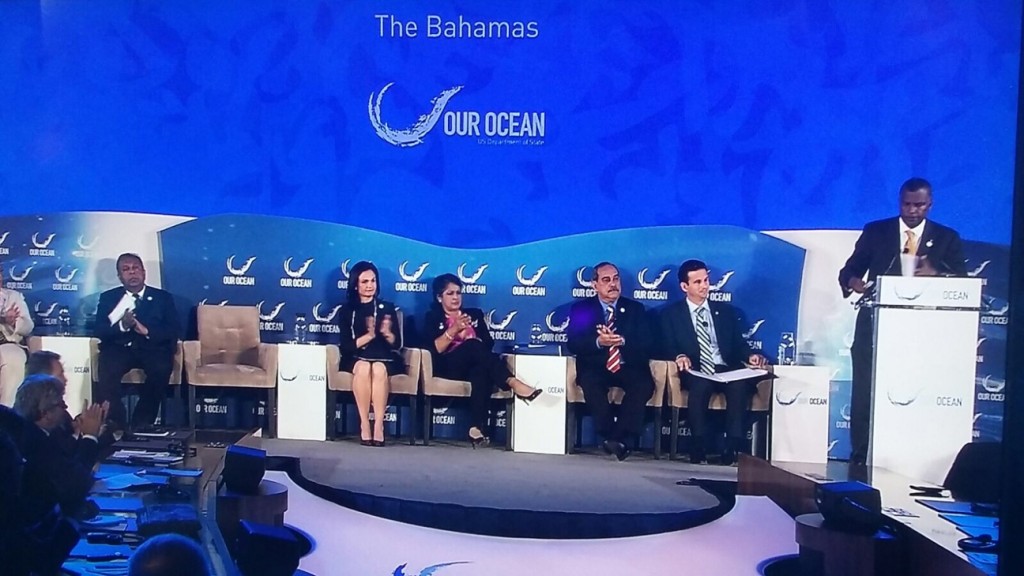Minister Mitchell – Presentation at Our Ocean Conference 2016
Remarks by
The Hon Frederick A. Mitchell, M.P.
Minister of Foreign Affairs and Immigration
Third “Our Oceans” Conference,
Global Ocean Leadership Panel
15 September 2016
Washington, D.C., U.S.A.
Please check against delivery
Ladies, Gentlemen:
I join in speakers before me in thanking the Government of the United States of America for hosting this most important conference. I am pleased to be here along with my colleague the Minister of the Environment, Mr. Kenred Dorsett, and more specifically I wish to thank the organizers for inviting me to participate in this timely panel discussion.
Appreciation for and reverence to the Ocean is an indelible part of the Bahamian psyche. Bahamians are inextricably linked to the Ocean. The Citizens of the Islands of the Bahamas, residents of an archipelago strewn across 100,000 square miles of Atlantic Ocean, find sustenance, the provision of livelihood and recreation in the waters that surrounds us.
Sustainable Development Goal (SDG) 14 therefore, is viewed with utmost importance by The Bahamas. We take very seriously the conservation and sustainable use of the world’s oceans, seas and marine resources. For that reason, The Bahamas was pleased to join the United States and others in the Safe Ocean Network, a global initiative aimed at combating all aspects of the fight against illegal fishing, including detection, enforcement, and prosecution.
Safe governance of the Ocean has also informed the decision of The Bahamas to seek another term on the Council of the International Maritime Organization (IMO), where we have established a reputation for upholding the highest standards of maritime safety, security and environmental protection.
An integrated management approach is needed in the conservation and management of the Ocean. There are several ways we have implemented this type of approach.
In 2008, The Bahamas became a signatory to the Caribbean Challenge Initiative (CCI) and is currently serving as Co-Chair of the CCI Council. The Bahamas is also committed to establishing 20% of the nearshore and marine environment as protected areas. Protected areas constitute an important stock of natural, cultural and social capital, many of economic benefit. They offer buffering capacity against storms and the impacts of climate change. The Exuma Land and Sea Park, which was established in 1959, was the first Marine Protected Area (MPA) in the region.
In 2016, the Marine Protected Area network was expanded from 2.2. million acres to 7.5 million acres of new protected areas across the archipelago, thus achieving more than 10% of the 20% CCI target. These new areas are protecting and conserving habitats for grouper and bonefish spawning aggregations, sea grass meadows, mangrove nurseries and important bird areas. We have met and exceeded the 10% mark, as we had committed to so doing last year. We are also well underway in identifying the remaining Marine Protected Areas to enable us to meet the 20% target before the year 2020. We have also established the Youth Environmental Corp which will train park wardens for the expanded Marine Park Area network.
In 2016, The Bahamas Protected Area Fund (BPAF) was operationalised. During this very week, stakeholders from across The Bahamas are meeting to review the requirements for further expansion of the MPAs. Information gathering and stakeholder input is crucial in this regard. With an existing annual economic gap assessment of millions of dollars, The Bahamas looks forward to greater collaboration with NGO’s and philanthropists to assist with management and enforcement of MPAs.
Illegal, Unreported, and Unregulated Fishing (IUU) is a major problem confronting sustainable fisheries management and development for my country. In an effort to confront this problem and others, the Government has taken the following steps:
- Invested $200M to further develop the assets of the Royal Bahamas Defence Force (Coast Guard);
- Involved all stakeholders including fishers in drafting new laws which impact them;
- Holding dialogues with neighboring governments whose nationals violate the exclusive economic zone of The Bahamas and its fisheries laws; and
- The government has recently increased the human capacity within the Department of Marine Resources by employing additional staff members who are posted throughout the archipelago, including several of the less developed islands where the Department was not previously represented.
Today, I am pleased to announce that The Bahamas plans accede to the Food and Agriculture Organization of the United Nations (FAO) Agreement on Port State Measures to Prevent, Deter and Eliminate Illegal, Unreported and Unregulated Fishing, which was adopted by the FAO Conference on 22 November 2009. I plan to deposit the “Instrument of Accession” with the FAO in New York next week, while I am in New York attending the 71st United Nations General Assembly.
In conclusion, permit me to reiterate how pleased I am to be a part of this discussion on the Ocean, which is described as “the lifeblood of planet Earth and humankind”. The integrated approach to Ocean management, sustainability, protection and conservation, to which I referred earlier, is imperative to permit the Ocean to be a viable source for the millions of people who use and depend on it in their daily lives. It is my hope that the discussions and commitments made today signals a greater focus on the Ocean in the climate agenda going forward, and we remain optimistic that as a small island developing state, that we can count on the international community’s further assistance and support as we strive to meet our environmental obligations.

